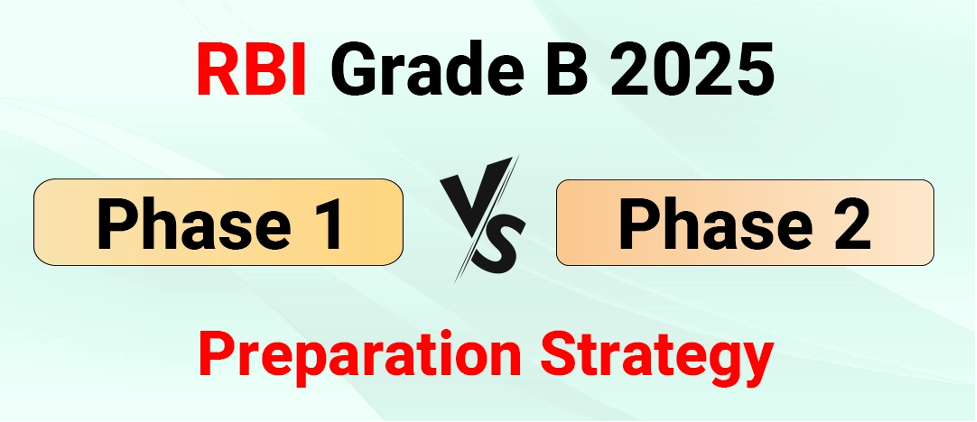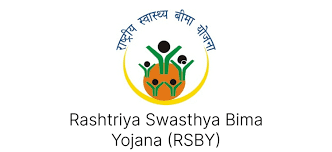RBI Grade B 2025: Phase 1 vs. Phase 2 Preparation Strategy

The Reserve Bank of India (RBI) Grade B Officer exam is one of the most competitive exams, attracting a large pool of aspirants each year. RBI Grade B exam consists of two phases: Phase 1 and Phase 2, each requiring a unique approach and preparation strategy.
In this article, We’ll break down the RBI Grade B Phase 1 and Phase 2 preparation strategy, offering valuable insights and actionable strategies. We’ll explore the unique demands of each phase, identify crucial preparation tips, and help you navigate your journey.
RBI Grade B Phase 1 Preparation Strategy
Phase 1 is the first hurdle between you and your dream of becoming an RBI Grade B officer. It comprises an objective-type written test, assessing candidates’ knowledge in 4 subjects:
- General Awareness
- Quantitative Aptitude
- English Language
- Reasoning Ability
The RBI Grade B Phase 1 exam is qualifying in nature, where you need to clear sectional and overall cut-offs to move to the Phase 2 exam.
Time Allocation and Focus Areas for Each Subject:
1. General Awareness (2-3 hours/day)
- This section covers a wide range of topics, including current affairs (national and international), banking and finance, the Indian economy, history, geography, polity, and static GK.
- Read major newspapers, magazines, and online resources.
- Tip: Make concise notes to revise quickly.
2. Quantitative Aptitude (1-2 hours/day)
- This section tests your numerical ability, data interpretation, and problem-solving skills. Quant topics include number systems, percentages, ratios, averages, time and work, probability, and more.
- Tip: Practice with speed and accuracy to improve problem-solving skills.
3. English Language
- The English section assesses your reading comprehension, grammar, vocabulary, and writing skills.
- Tip: Practice reading newspapers and attempt RC passages to boost speed and accuracy.
4. Reasoning Ability
- Reasoning tests your logical and analytical abilities by asking questions on various topics including puzzles, seating arrangements, blood relations, syllogisms, and data sufficiency.
- Tip: Solve puzzles and logic-based problems regularly to sharpen analytical skills.
RBI Grade B Phase 1 Preparation Tips
- Understand the Basics
- Build a strong foundation in all subjects.
- Refer to multiple resources, such as standard textbooks, online resources, and study materials specifically designed for the RBI Grade B exam.
- Analyze Previous Year Questions (PYQs)
- Analyzing RBI Grade B previous year question papers helps you understand the exam pattern, difficulty level, and frequently asked topics.
- Attempt Mock Tests
- Regularly attempt full-length mock tests to simulate exam conditions and identify areas of weakness.
- Focus on Weak Areas
- Identify your weak areas and dedicate extra time and effort to improve your performance in those sections.
- Stay Consistent
- Regular practice is crucial for all subjects to improve speed, accuracy, and time management.
- Current Affairs
- Stay updated with current affairs through newspapers, magazines, and dedicated current affairs resources. It’s vital for both Phase 1 and Phase 2.
- Time Management
- Develop effective time management strategies to ensure you can attempt all questions within the allotted time.
RBI Grade B Phase 2 Preparation Strategy
Candidates who successfully clear the RBI Grade B Phase 1 proceed to Phase 2. This phase comprises 3 papers:
- Finance and Management (FM)
- Descriptive English
- Economic and Social Issues (ESI)
Unlike Phase 1, Phase 2 requires in-depth knowledge and understanding of concepts, especially related to Finance and Economics.
Time Allocation and Focus Areas for Each Subject:
1. Finance and Management (FM) (2-3 hours/day)
- This section tests your knowledge about the financial system and fundamentals of management.
- Its topics include financial system, financial markets, risk management, budget, inflation, accounting, fundamentals of management, HRM, leadership, ethics, corporate governance, communication, organizational behavior, and more.
- Tip: Understand key financial concepts and their real-world applications. Refer to RBI reports, economic surveys, and management textbooks.
2. Descriptive English
- This section assesses your written communication skills through essay writing, precis writing, and asking questions based on reading comprehension.
- Tip: Practice writing essays and précis on various topics, focusing on clarity, coherence, and language skills.
3. Economic and Social Issues (ESI)
- This section tests your in-depth knowledge of the Indian economy, globalization, and social development and issues.
- Tip: Stay updated with recent reports and economic surveys from organizations like RBI, IMF, and World Bank.
RBI Grade B Phase 2 Preparation Tips
- Stay Updated on Current Affairs
- Focus specifically on finance, economics, and social issues current affairs for Phase 2. Read newspapers, government reports & schemes, reputed economic journals, and reports published by reputed institutions like RBI, IMF, and World Bank.
- Develop Analytical and Critical Thinking Skills
- Analyze economic data, interpret reports, and form your own informed opinions on current economic and social issues.
- Enhance Writing Skills
- Practice RC, essay, and precise writing exercises regularly. Focus on clarity, conciseness, and effective written communication skills.
- Focus on Conceptual Understanding
- Avoid mere memorization of facts. Instead, aim for a deep understanding of the concepts in FM and ESI.
Like RBI Grade B Phase1, it is also important for you to analyse PYQs, practice mock tests, and practice regularly.
Common Ground for Phase 1 & 2 Preparation Strategy
Current Affairs form a crucial foundation for both Phase 1 and Phase 2 of the RBI Grade B exam.
- Phase 1 requires a broader understanding of current affairs across various domains, including national and international news, banking, economy, polity, and social issues.
- Phase 2 focuses on current affairs specifically related to Finance, Economics, and Social Issues.
While the scope of current affairs may differ, the knowledge gained during Phase 1 preparation will significantly benefit your Phase 2 studies.
Key Takeaways
- Both RBI Grade B Phase 1 and Phase 2 require dedicated preparation and a structured approach.
- Consistent practice, in-depth study, and a focus on conceptual understanding are crucial for success.
- Current affairs are essential for both Phase 1 and Phase 2, so keep yourself updated with the latest events, especially those related to Finance and Economics & Social Issues.
- Balancing your time efficiently between preparation for all subjects and revising regularly is critical.
- Stay calm and organized throughout your preparation journey. Stress can affect performance, so focus on progress rather than perfection.
- Thoroughly analyze the RBI Grade B notification to understand the gap between Phase 1 and Phase 2 exams, and adjust your preparation strategy accordingly.
By following these strategies and maintaining a consistent and disciplined approach, you can increase your chances of cracking the RBI Grade B exam. Remember, the journey may be challenging, but with dedication and perseverance, you can achieve your goal of becoming an RBI Grade B manager.




Leave a Comment